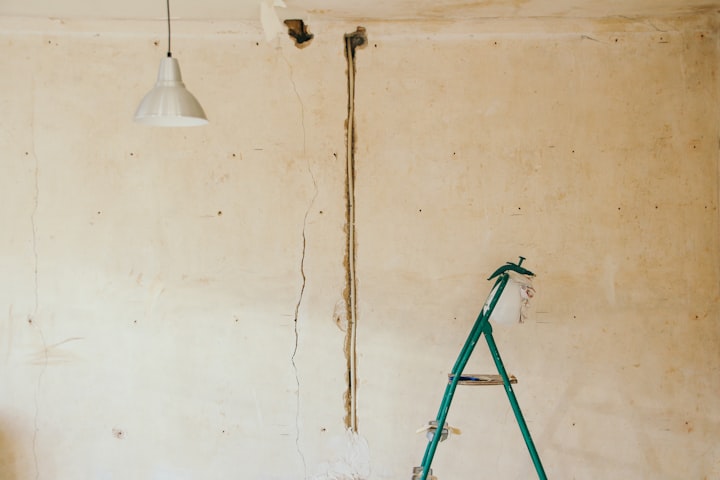Up and Down Ladders
An uncle and nephew share more than a workload.

Jacob often thought that all painters were a little odd just like his uncle Moses was. The typical sort of lonely fellow who never married yet worked very hard and never seemed to spend a dime from it. He was from a time and place where maybe it was easier to settle down alone than to do anything else. Moses was quiet and tall, he had a grave face and when seen about the town Jacob’s friends would say he creeped them out. As far as Jacob saw it, his uncle was generous and warm, come Christmas and birthdays a card would always come to him or his siblings with at least a ten pound note taped to the top. Beyond these polite gestures and the odd question about school, Moses was unknowable to his nephews and nieces, in fact many people would have said something similar. He had a few friends from playing bowls but they never seemed particularly close, he was well liked by the wider family but rarely invited for dinner. He lived with Jacob’s grandma, his mother, up until she died and he solely inherited the family home, causing small but not insignificant tension throughout the wider family. This hardly mattered to the grandchildren or Moses’ brothers and sisters, it would always be grandma’s house to them.
Moses was a painter by trade and had done bits and pieces in nearly everyone’s house and a good few businesses in a ten mile radius. He was incredibly well versed in every shape of wall and shade of paint. Jacob caught a glimpse of this first hand as he became Moses first and only hired hand when he turned fifteen. Moses kept a tight record of every job he was on in a small black notebook that always seemed to be the exact same one. After he passed away Jacob found a stash of thirty used note books all identical with decades worth of jobs inside. These notebooks held all the dimensions, pricings and colours he needed to complete each job and invoice accordingly. It also acted as a kind of doomsday book for this little town, as nearly every address and a decent estimate of the square footage of each house was recorded within it. Jacob often had a read through this book and therefore knew that uncle Moses must have a decent amount of money at his disposal. A busy man, tight with his money and well versed in handling finances could only be a rich one. Jacob also noted that Moses had few vices, he gambled sparingly and only drank on a Friday evening whilst watching the late late show at the pub.
With this information and a lot more access to Moses than most, Jacob felt that he was the only person that really knew him. He had let few into his life and now that Grandma was long buried, Jacob held a connection to Moses that was important. He felt that he was Moses only attachment of the rest of the world. They worked away most days after school and during the weekend. Moses would pick him up in the white van with those faded and stained overalls on and they would be up and down ladders until teatime. Very little was said between the two of them, the odd tip here or there and maybe a little about the weekend’s sport. However, occasionally Moses would start talking about Oxford rowing, this started the first year that Jacob worked for him. It was a Saturday in April and as Jacob was suggesting who he’d back in the football his uncle asked had he ever watched the London boat race? Moses then began to explain it to his nephew, the rivalry, the techniques and even a few of the better rowers of the last decade. As time went on, and Moses started talking infrequently about these races, Jacob learnt that his uncle was not just interested in rowing. Moses was a landlocked sailor who knew about many types of watercrafts, when he talked about them Moses’ enthusiasm surprised and amused Jacob. He talked about seeing the tall ships in Belfast Harbour and remarked about the NATO submarines stationed outside Aberdeen. Despite the width of this knowledge on boats he always came back to the boat race and how it was a dream of his to race for Oxford. How he thought he would ever have competed in this niche annual event was beyond Jacob. Moses talked about how he was named after a man who parted the sea and how maybe in another life he would have hoisted a dark blue boat over his shoulder and parted a stretch of the Thames himself. Secretly Moses detested himself for never having the brains nor the muscle to enter into this fantasy.
Soon it was Jacob’s turn to also not make it to Oxford or Cambridge, secretly his uncle dreamt that Jacob might live out his dream but now that idea was buried too. Jacob did well at school but not that well and ended up going to university elsewhere thus leaving his uncle to paint alone. Jacob returned every holiday he could to scrape up some extra money helping his uncle but mainly Moses was back to working by himself. Maybe it was the work that killed him, he was running about the town so quickly he felt like he was meeting himself at the roundabouts. He had spread himself far too thin and one exhausting Thursday when he was up a ladder in the Church hall he slipped off and broke his neck. He was found an hour later by the vicar covered in red paint. The vicar was then found by the organist as he had passed out at the sight of uncle Moses, the paint really manipulated the scene. It was a shocking way to go and Jacob would not believe that a man so skilled at running up and down walls could have passed on that way. It took seeing him at the wake for it all to sink in. Lying there in the same bed his mother was in not five years before. No kids to take on his name and yet plenty of well-wishers who barely knew him. What Jacob came to learn during all those days spent with him on many jobs was that truthfully there was not a lot to know about Moses. He was simply a polite man who worked incredibly hard and whose one dream was dashed so early on he just got on with life. A life that was as hard as many yet equally a life that would be hard to find many faults in.
Moses’s knew that not having any children offered him the rare freedom of guiltlessly having favourites and being free to execute his will how he saw fit. He took pleasure in updating his will many times whilst he was still breathing and of course Jacob found his way in, ahead of his siblings and any of the other nephews and nieces. The family home was to be sold and the money spilt equally between Jacob’s mother and her surviving siblings. Much of his cash assets, of which he had quite a large amount, went to a lifeboat charity that patrolled the north coastline. Twenty thousand pounds was left to Jacob and when he found this out he was of course ecstatic. He had mentally spent it on a car, the chance to impress some girls and maybe even the start of a mortgage deposit. These grand aspirations were all ruined one morning when a letter from Moses’ lawyer arrived in the post addressed to Jacob. The letter was Moses’ goodbye to Jacob and in it there was one instruction on how to spend the money. Moses’s last wish was for Jacob to spend his money on a boat. Of course there was no legal binding to this request, as the lawyer later stated in the letter, but this was his wish. Now Jacob did not live near any considerable lakes or the sea, he knew no one who sold or had ever bought a boat, he also really needed a car. Yet he was also reminded of a day when Moses and him were working on a job and on the radio a song called Dignity came on. Moses knew every word to this song, by the Glaswegian band Deacon Blue, and sang freely about a man who worked for a council dreaming of sailing off into retirement. In the end Jacob had to choose between himself and a man who only he really knew, a man whose dreams were only known by him. He knew that, although there were no real repercussions either way, this was probably the biggest choice he would ever have to make.






Comments
There are no comments for this story
Be the first to respond and start the conversation.